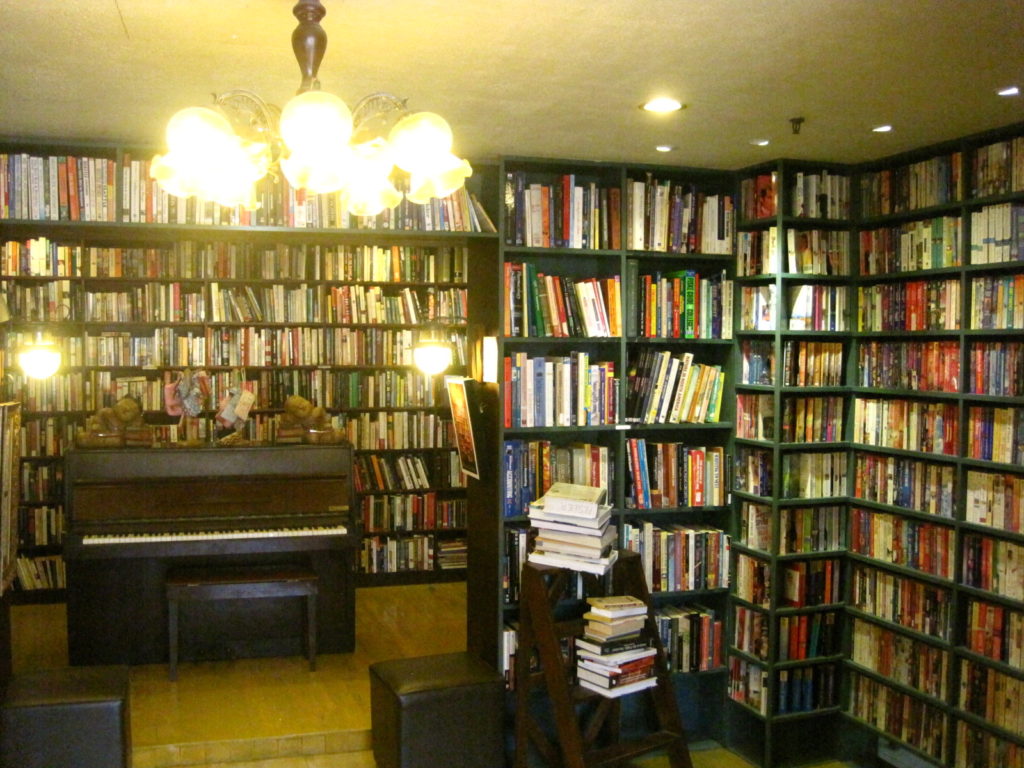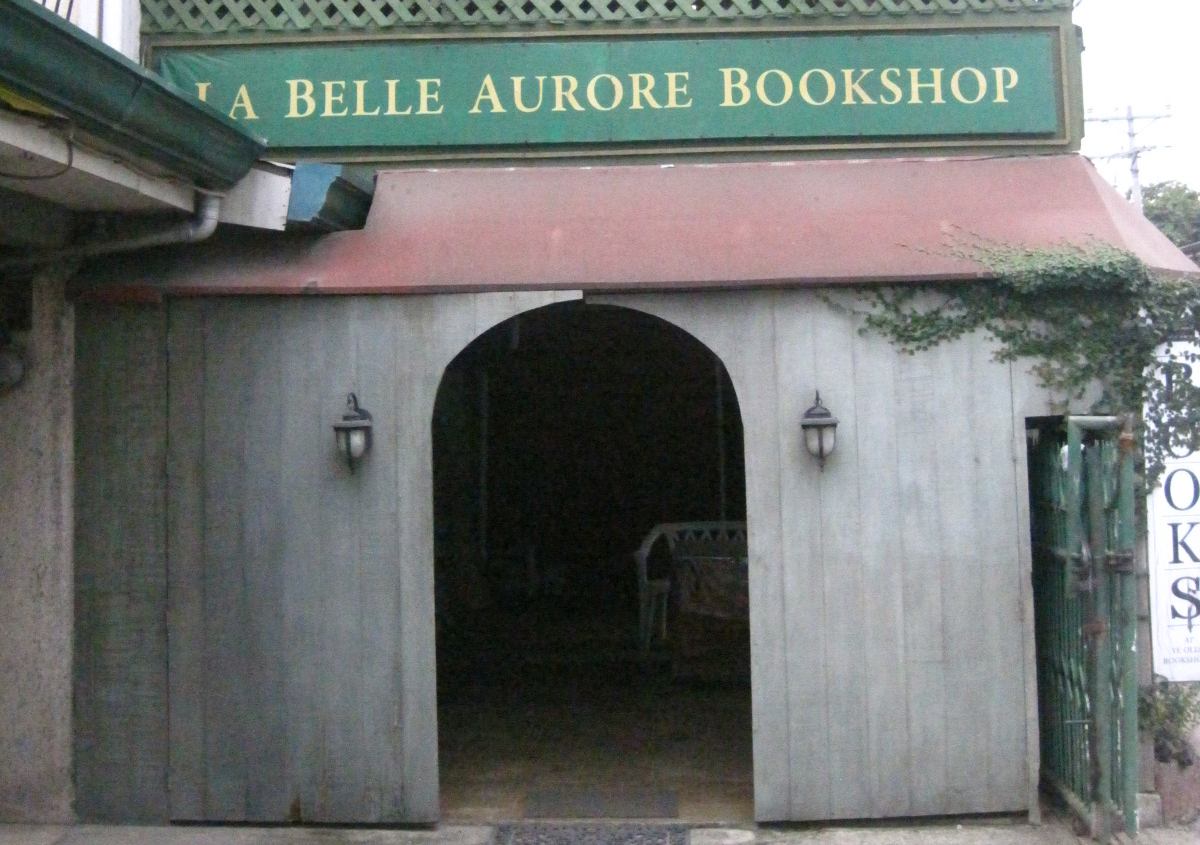
By MA. THERESA ANGELINA QUINTANA TABADA
IT’S squeezed in among a sardine cannery, a mattress wholesaler and junkyard on Hernan Cortes Street in Mandaue City and requires the carless to endure a jeepney then tricycle ride through heavy weekday traffic dominated by container vans and trucks.
But book hunters hardly mind the perils of the odyssey. Pushing past the vintage glass-and-wood door that sets a bell tinkling, they are greeted by rows of books shelved wall-to-wall. Dark walnut-stained cabinets complement the black and white tiles arranged in a checkerboard motif. Taped to the sides of bookshelves are handwritten letters and clippings.
This is certainly not the cramped and dusty hole that’s the usual setting for secondhand books. In fact, La Belle Aurore could very well be a cozy private library, except that one can buy and take home the books.
La Belle Aurore’s aura of book-scented romance befits its name, borrowed from the French bistro where Rick (Humphrey Bogart) and Ilsa (Ingrid Bergman), the star-crossed lovers in the classic romance “Casablanca,” stayed before parting.
“The feel of the shop is modeled after Shakespeare and Co. in Paris,” said Joseff Lee, 25, who opened the bookshop in the heart of industrial Mandaue in 2009.
He was referring to the famous pre-World War II bookstore that drew Left Bank writers, journalists and other intellectuals. A second bookstore named after the original Shakespeare and Co. still exists in the Left Bank and draws both the famous and the unknown to its reading library-cum-bookstore.
Beyond romance
In the three years that La Belle Aurore has been operating, Lee said he has come to accept this: “The romance of bookselling needs to be paired with the reality of business in order for it to thrive.”
A self-described “casual reader” who reads whatever he gets his hands on, Lee decided to sell books as a way of sustaining a lifelong but increasingly expensive hobby.
“When I realized that I could get more books with the same amount of money I would spend for a brand-new book, the idea of secondhand books suddenly became romantic,” he recalled.
Lee went online and consulted members of istorya.net, which holds forums on a variety of topics catering mainly to Cebuanos. Not only did he learn that other readers also agonized over the price of a brand-new copy, he got orders for a hundred titles, which convinced him to push through with his plan.
The neophyte entrepreneur, then 23, borrowed P50,000 from his parents to start the business. He opened La Belle Aurore on 10 square meters of commercial space his family owns on Hernan Cortes. He started with 3,000 titles and earned a profit after a year or so.
After the novelty of the bookstore’s opening waned, Lee realized the tough underside of the business: Customers set a ceiling for what they were willing to spend on secondhand books.
Inventory was everything, too. Customers asked for a certain title and left without buying anything if La Belle Aurore did not have it.
“The problem with a good selection of books is that it costs more in terms of time, effort and money,” Lee said. “It is seldom to see someone come in the shop and actually browse around the selection and give an unfamiliar or unpopular book a try.”

Last year, Lee opened a branch on Junquera Street in the downtown district that is Cebu City’s old seat of business. It’s as cozy as the Hernan Cortes branch.
Students from nearby universities form the bulk of the Junquera branch regulars. Lee has spotted Dr. Resil Mojares, professor emeritus of the University of San Carlos and a multi-awarded writer, browsing the collection of scholarly titles and European literary fiction.
While he stocks on commercially popular titles in the mystery/suspense/thriller and romance genres, which are La Belle Aurore’s reliable bestsellers, Lee hopes to have ample and updated selections of philosophy books, the classics and modern literary fiction.
The cheapest book in their inventory is P8. For popular authors like Dan Brown and Sidney Sheldon, La Belle Aurore sells a secondhand copy for about P150, a steal when one considers that a brand-new copy would be pegged at P300 and a used copy sold by mall-based booksellers at P200.
Highbrow books like Rainer Maria Rilke’s Letters to a Young Poet are P400 or more for a brand-new copy. At La Belle Aurore, a mint copy sells for P150 to P200, and the price may go down if the book remains unsold after a time.
“I haven’t felt the threat of ebooks yet. I may be biased, but I think there is still a large market for traditional books in Cebu,” said Lee.
Wooing readers
He admitted, though, that younger readers need to be enticed with events and marketing promos, a strategy he learned from Sylvia Whitman of Shakespeare and Co. who once said in an interview that running a bookshop now means no longer just waiting for customers to come in.
The Junquera branch has hosted poetry readings and performances of The Nomads, young professionals from Visayas and Mindanao who write poetry; The Really Bad Poets, a local group of thespians and artists; and local bands.
Last July 2, classical music permeated La Belle Aurore, thanks to Sistemang Pilipino, an organization that provides music education and performance opportunities for children in underserved communities.
As La Belle Aurore struggles to increase sales, Lee struggles to keep his aspirations. Of two possible translations of the bookshop’s name, Lee said he prefers “The Beautiful Daybreak” to “The Beautiful Aurore (a woman’s name).”
“I like the meaning of the former for signifying beginning and light,” he said. “There is a certain intimacy in reading books that can’t be found elsewhere.”
